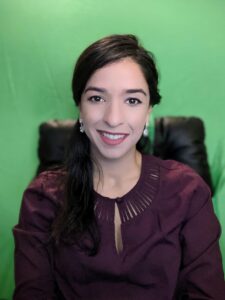Ph.D. Student Nika Nour Awarded 2022 Google Fellowship to Explore Effects of Deepfakes

“I wasn’t even going to apply for this fellowship,” says Informatics Ph.D. student Nika Nour when asked about receiving the 2022 Google Fellowship. “I was so defeated because I had already received so many rejection letters from major tech companies and think tanks [that] I was this close to not applying.” In other words, Nour was “this close” to not receiving three years of paid tuition and fees; full funding for living expenses, travel and personal equipment; and guidance from a Google Research mentor.
Now, having secured this funding and support, Nour can hone in on her research into deepfakes — videos or images manipulated to misrepresent someone and present misinformation — and their effects on people and society.
“It is such a relief! After navigating the Ph.D. process in a global pandemic, I finally feel in control of my doctorate and academic destiny,” she says. “The main message to others is, ‘Don’t give up!’ Even when you’re feeling down on your luck and hopeless, listen to that little academic FOMO [fear of missing out] voice and let that fuel you. Apply! Apply! Apply! Every ‘no’ is one step closer to a ‘yes.’”
Influencing the Future of Technology
Google created its Ph.D. Fellowship Program for those who seek to “influence the future of technology.” The program recognizes “outstanding graduate students doing exceptional and innovative research in areas relevant to computer science and related fields.”
Nour was selected for one of six coveted fellowships in the area of human-computer interaction. Her Ph.D. adviser, Professor Constance Steinkuehler of UCI’s Donald Bren School of Information and Computer Sciences (ICS), submitted the nomination and research proposal on Nour’s behalf. (Students cannot apply directly to the program; they must be nominated.)
According to Google’s Ph.D. Fellowship Team, “the student nominations we received were exemplary in their quality, but Nika especially stood out and was endorsed by the research scientists and distinguished engineers within Google who participated in the review.” Group Product Manager Harris Cohen will serve as her mentor.
Exploring the Effects of Visual Misinformation
Her proposed thesis, “Effects of Misinformation Online on Judgements of Truthfulness and Recall,” aims to “examine how people discern the truthfulness of multimodal information and the longer-term consequences of exposure to visual misinformation on memory.” In addition, she hopes to explore the consequences of misinformation on an individual’s personal values, ideals and beliefs.
“I’m not going to solve everything involving misinformation online, but I’d like to at least move the conversation one step further,” she says. “There has been a lot of technical work done on deepfake detection, but there hasn’t been a lot of socio-technical work done on what the actual consequences mean for a society’s foundation built on trust and democracy.” A long-term goal of her work is to support the creation of interventions that will increase our resilience to misinformation.
— Shani Murray